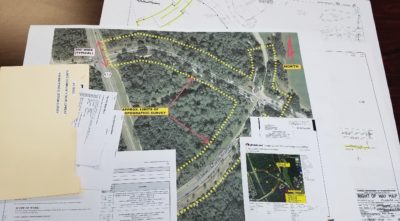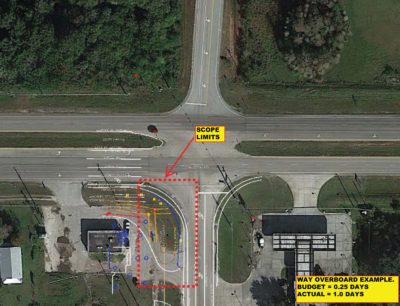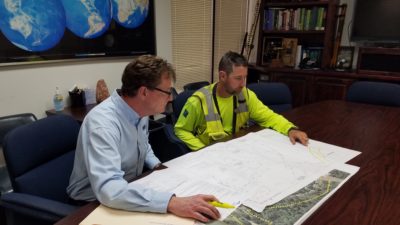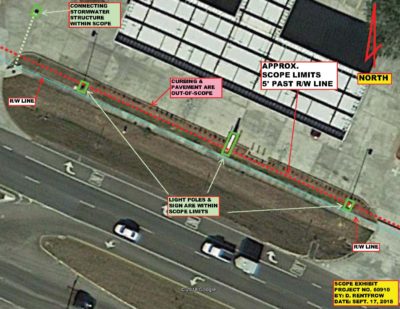 Survey projects are routinely plagued by scope violations. One cause of this problem is that technicians assigned to the project are not familiar with the scope. If the staff has only a sketchy knowledge of the scope, the project is susceptible to cost overruns and schedule delays. Unfortunately, the tedious nature of a scope is only captivating to the person(s) who wrote it. In fact, many clients are more concerned with cost and schedule, than they are with the details of the scope. However, technicians must comply with the scope, and they need more than encouragement—they must study the scope. Money is at stake!
Survey projects are routinely plagued by scope violations. One cause of this problem is that technicians assigned to the project are not familiar with the scope. If the staff has only a sketchy knowledge of the scope, the project is susceptible to cost overruns and schedule delays. Unfortunately, the tedious nature of a scope is only captivating to the person(s) who wrote it. In fact, many clients are more concerned with cost and schedule, than they are with the details of the scope. However, technicians must comply with the scope, and they need more than encouragement—they must study the scope. Money is at stake!
A project needs more than just busy hands to flourish—it also needs active minds. All projects benefit from well-informed participants. Employees who delve into the scope and become intimate with a project can conduct the operation more efficiently and express concern over its outcome.
If the technicians study the scope, they can create an effective plan to streamline the various processes or help develop initiatives. This type of creative process is used throughout the business world. For example, in the movie industry, it’s essential that the cast and crew study a script prior to filming to develop their own characters, costumes or techniques. Imagine an actor showing up the day of a film shoot, and informing the director, “I haven’t read the script. Just tell me what to say, where to stand, and how to act.” The director is likely to replace that actor.
Unfortunately, in the survey industry, it’s rare when the field crew or technicians are familiar with a project from the onset. When workers have little or no knowledge of a project, they require a thorough explanation of the job and may need to be guided every step of the way. Conversely, workers who are familiar with a project will take an immediate interest and require far less guidance. Hence, the initial stage of the operation becomes more streamlined, and creative interest will be immediately generated.
In both surveying and the movie industry everybody hopes the final product is a big hit.
Kick-off Meeting
In the surveying industry, the Field Crew and CAD techs are usually introduced to the project during a “Kick-off Meeting” usually conducted by the Project Manager. The purpose of this meeting to convey the project scope and objectives. Unfortunately, this vital meeting may not generate much excitement, and the results can be quite disappointing.
Although the term “Kick-off” is derived from football, it is inappropriate when applied to surveying. Prior to the kick-off of a football game, coaches and players alike have thoroughly prepared for their opponents, developing an integral game plan, and planned for most any eventualities. In the surveying industry, the Party Chief usually learns of the project details on the same morning the field work begins, without the benefit of any preparation or planning. This lack of readiness can impact both productivity and effectiveness.
To help alleviate this problem, the Party Chief should study the scope, prior to the Kick-off Meeting. This background knowledge will enable the Kick-off Meeting to go much smoother and avoid the need for clarifications.
The details of a scope can be very complex and difficult to grasp. For instance, FDOT projects may involve up to 30 different field tasks, and an equal number of mapping activities. Construction projects can be equally intricate, with the staking of various proposed improvements and development stages involved. During the Kick-off Meeting, the ultimate objectives should be summarized with emphasis placed on the immediate task at hand, such as recovery and establishment of control.
The beginning of any project should generate a certain degree of excitement, but a complicated survey project could easily baffle or even discourage the workers. With no advance preparation, the “shock” value of the project may adversely affect the team from a psychological standpoint—even to the point of being overwhelmed by the magnitude of the project. If the project is complex, the team may lose focus on the scope, hoping their colleagues have grasped the assorted concepts. Consequently, the eagerness of exploration may be stymied by uncertainty, and the moment of discovery is lost in the fog of details.
The complexity of the scope is directly proportional to the tedious nature of the Kick-off meeting. If the Project Manager simply recites the scope, the staff may lose interest and even become drowsy. The Kick-off Meeting then morphs into a bedtime story. Occasionally, the staff will lose focus on key instructions, and become distracted. Some participants may quietly devise their own approach. Others simply lose interest in the meeting, altogether. This “deer in the headlights” reaction has been witnessed by all Project Managers, causing a certain feeling of dread. A Kick-off Meeting might conclude with the following exchange:
“Do you have any questions?” the Project Manager asks the Chief.
“We’ll figure it out,” replies the Chief with a shrug.
(Translation: “I have lots of questions, and the project is doomed.”)

Example of Field Team going well beyond the scope limits in every direction. producing data that was eventually processed, drafted and verified.
Free of Charge
Projects are frequently afflicted by “scope creep”, which is the process of exceeding well-defined scope limits or tasks, resulting in cost overruns and schedule delays. In some cases, the client needs more data, and hopes the surveyor will provide it free of charge.
Unfortunately, a large amount of scope creep is caused by the staff assigned to the project. This sometimes happens because they are simply not familiar with the scope. If the staff “skims” over the scope, without attempting to gain an intimate knowledge of the project requirements, the result is often a haphazard approach to execution.
Since the main goals of any project are to achieve scope objectives, within schedule and budget parameters, then well-defined scope boundaries are crucial to meeting those goals. However, these boundaries are sometimes blurred by both client and surveyor alike. Unfortunately, when a field team exceeds scope limits, both budget and schedule are adversely affected (see illustration). When the scope is violated, the Party Chief may defend this action by saying, “I knew the client would want this.” The Chief may possess certain powers of E.S.P., but still needs clear authorization prior to any scope deviations. The one absolute is the client wants the survey ASAP.
The Party Chief may further defend this action by claiming “it didn’t take that long.” However, this estimate does not include the time necessary for processing, drafting, Quality Control, etc. And if the survey is flawed, corrective measures are also costly.
Construction projects frequently suffer from scope creep. Superintendents are notorious for using a field team for whatever suits their purpose. It may be to set an additional benchmark or replace a stake. The Chief wants to stay in good favor with the client, so the out-of-scope work is provided without obtaining the necessary authorization.
When a Party Chief deliberately exceeds the scope, the Project Manager should ask, “Who is going to pay for all that?” The Chief may be disappointed that no praise was given for the extra effort. The Project Manager should identify the costs of salaries, materials, fuel, insurance, etc., and then ask the Chief to provide their own estimate for additional work, so they can appreciate budget constraints.
Conversely, when confronted about the field data falling short of the scope limits, the Chief will ask, “Do you realize how long it would take to get all that?” Counter by asking, “How long do you think it will take?” These tests will help the Chief understand the various aspects of the estimating process.
Creativity
Creativity is necessary in both formulating and executing a plan. Encourage participation in the creative process to improve efficiency and tackle difficult problems. Listen to every suggestion. Some suggestions may already be a part of the plan, and some may not be useful at all. However, if only one idea out of twenty is used, it may be a gem, so every idea must be considered. If all ideas are summarily rejected, then team members will become discouraged and reluctant to offer any suggestions, wanting to avoid certain humiliation. This may even cause the team to remain silent when they are certain a mistake being made.
In this context, creativity is not necessarily devising an innovative approach, but more of an ability to envision the processes necessary to achieve desired goals. If the Team has some advance knowledge of a project, they can ponder over the major events, and conceive their own ideas for executing the various tasks. For example, if a team knows the survey falls within dense woods, they can make certain their machetes are sharp. If the Field Team has only sketchy details, they will have to scramble to prepare and may forget something essential to the process.
The field team should be encouraged to explore the scope, as well as the other contents of the field folder, including plats, R/W Maps, deeds, standards, etc. (see illustration) Some surveyors find this type of research a tedious exercise, but exploration is the stock-in-trade of surveying, so research is a necessary function and must be done with gusto.
The Hard Part
The cost of preparation will vary depending on complexities and scheduling parameters. If Chiefs are expected to know the scope, they cannot be rushed through preparation. The 1st question of the Kick-off Meeting should be “have you studied the scope?” If the answer is “no”, then allow them time for that purpose. This may amount to a costly delay but will be time well spent if they re-emerge with a grasp the concepts and have formulated a plan. Give the Chief the opportunity to explain his or her approach to executing the plan. It may not be the exact the path you had in mind, but it will demonstrate the Chief has carefully considered matter and has developed a viable plan. And if a problem arises, at least the Chief will be better prepared to devise a solution, instead of struggling.
There will also be an adjustment for management. Crews are expected to hit the road by 7:15, but it may be necessary to start a half an hour earlier. Also, encourage the team to discuss the project on their way to the job site. Unfortunately, there are many cases of Field Teams driving to the job, only to return to the office because they forgot something essential to the job. When that occurs, it’s unsettling to think that the crew never discussed the job but knowing there was plenty of talk about sports, or fishing or pretty girls. Hopefully, the team will learn a valuable lesson from that episode and focus on their duties—along with the pretty girls.
Employees will react differently to this approach. Some will take it lightly and maintain the status quo. Other workers may initially adopt the philosophy, but their enthusiasm will fade in time. Others will take it to heart and will display an inquisitive nature in all aspects of the job—something we pray for in the surveying profession. Of course, a go-getter may be teased by their co-workers and branded as a “company man”. However, in the eyes of Management, that person may be characterized as an excellent worker. In any event, that person is the star of the show.◾
Dave Rentfrow is a Level IV Certified Field Manager and Level IV Certified Survey Office Manager, and has been a Project Manager since 2006.

